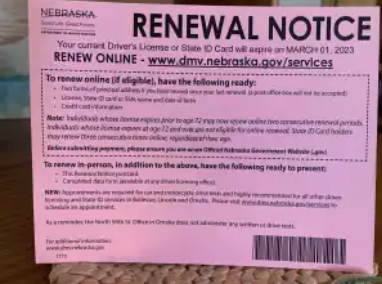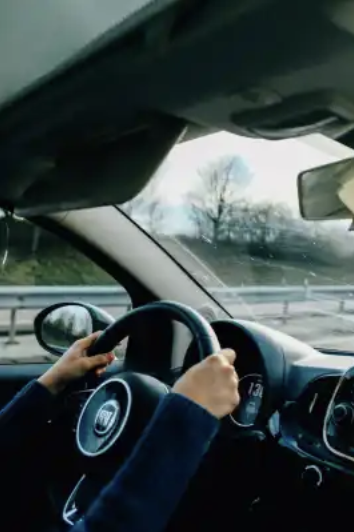The first time I felt old.
It arrived in the mail, a little pink post card. I expected it as I knew this was the year my driver’s license was up for renewal. Piece of cake, I thought. I’d had no traffic violations, so I expected to jump online and get it done.
Oops. Not so fast. A closer read revealed that since I’d now fallen into the category of ‘old’, I’d need to appear in person. In Nebraska, age 72 is when you can no longer rely on online renewal. Really?
I guess it’s not really any big deal, but it just served as a reminder that I’m falling into the elder category. It’s a bit of a hard pill to swallow since I really don’t feel ‘old.’ Numbers, ages are a funny thing. So relative. Made me wonder how they’d come up with age 72.
It also made me think about “aging” drivers. Can I be in that category? Ironically, just after receiving the renewal notice, I read an article about a traffic fatality that involved a 72 year old man who pulled out onto the highway and was struck by an oncoming pickup. What message was the reporter sending by identifying the age of the driver? An accident due to an aging driver? I’m not sure.
Photo by Adrien Olichon on Pexels.com
Thirty years ago the National Insurance Institute for Highway Safety predicted that as the baby boomers aged there would be a dramatic increase in crashes and driving fatalities. Interestingly enough, that didn’t happen. In fact, a recent study showed a significant decline in fatal crashes among drivers 70 years and older compared to middle age drivers.
Still, all of this reminded me of now being considered the “elder driver.” I found that AARP has a ton of information about this age group, their driving statistics and helpful advice for the older driver. Like a self-assessment tool to determine current abilities behind the wheel. There is also information on how to tool up your driving knowledge and skills.
Driving is a feeling of independence that can be difficult to give up. I joke that in my later years I’d prefer to have a driver, aka “Driving Miss Kate.” I’ve also alerted our grandchildren that when they become seasoned drivers, they can make the 9 hour trip to the Minnesota cabin, me in tow.
All in all, it made me think about the feeling of independence and how it can start to erode as we age. Furthermore, it makes me wonder how I will feel about giving up some of my independence when it’s wise to do that. That independent feeling can waiver or change significantly in a heart beat. It might be brought on by an accident or a health episode that makes it necessary to depend on someone else. Or it might creep in slowly, leaving family members to make difficult decisions — like taking away the car keys. I saw my own mother struggle with those stages, like when she’d had a few too many minor fender benders. Or when her own health and well being started to diminish and it wasn’t wise for her to live alone in her own home. Some handle those transitions easier than others. That pertains not only to the one experiencing the transition but also the one recommending it.
What stands in the way of making these life transitions? Lots of feelings, to be sure. Fear, for one. Pride, too. I know I found it hard to talk with my mother about the issues. She had taken so much pride in her busy schedule of card playing, volunteering, social outings. And a strong-willed woman did not take kindly to the prospect of having no wheels, much less considering moving out of her home to an assisted living facility.
The reality is life is full of transitions. It’s when they are thrust upon us without preparation or communication that they can be unnerving and upsetting. But it also requires a certain mindset, an openness to have the conversation and admit certain things, to be proactive. And perhaps the hardest thing of all, to ask for help in the process.
Nothing stays the same. This life journey we are on has many transitions. Sort of like rooms. We pass through one room and the door may close behind us. I don’t want it to slam shut. Better yet, I want to be the one to close it softly and make plans to get comfortable in the new room I have just entered.
I recently read an ebook entitled “Anatomy of A Transition.” Seems all of life is about several different kinds of transitions. The author lumps them into six: personal, physical, psychological, passing, professional and purpose. All have their challenges, which, the author says, can be messy at least for a while, but if worked through and admitted, can reveal new opportunities and choices.
Choices — that can sometimes be the hardest thing about navigating a transition or a change. We don’t think we have any choices. However, if we dig deep enough and remain open, lots of options are revealed.
Jump back to the older driver. Many readers weighed in on the AARP website — both elder drivers and their children. One struck me. It was a reader remarking about concern for his mother’s driving. He lived two hours away and obviously couldn’t run errands for her, so he felt she needed to drive herself and he “hoped” she wouldn’t have an accident. Wait a minute. Will he wait until an accident necessitates a change. Better yet explore now the available choices, of which there can be many, depending on what’s needed. Meal deliveries, UBER eats, grocery store deliveries, support of neighbors and friends. Dig deep to uncover the options.
When we dissect an issue and think through it, we can usually find there are several choices available. And at the end of the day, even if we find very few to our liking, the one that counts the most is our attitude toward the dilemma we face.
So what’s the lesson I’ve learned from having this realization that “I’m old.” Correction: I’m 72 and I feel great. I marched into the examination room with a smile on my face (for the new photo id), passed the eye test and walked out with a newly renewed driver’s license.
There’s another bright side to this age designation. I just received notice for jury duty. But guess what, because I’m “old” (over 70) I can respectfully decline. Oh, the options that go along with growing older.

